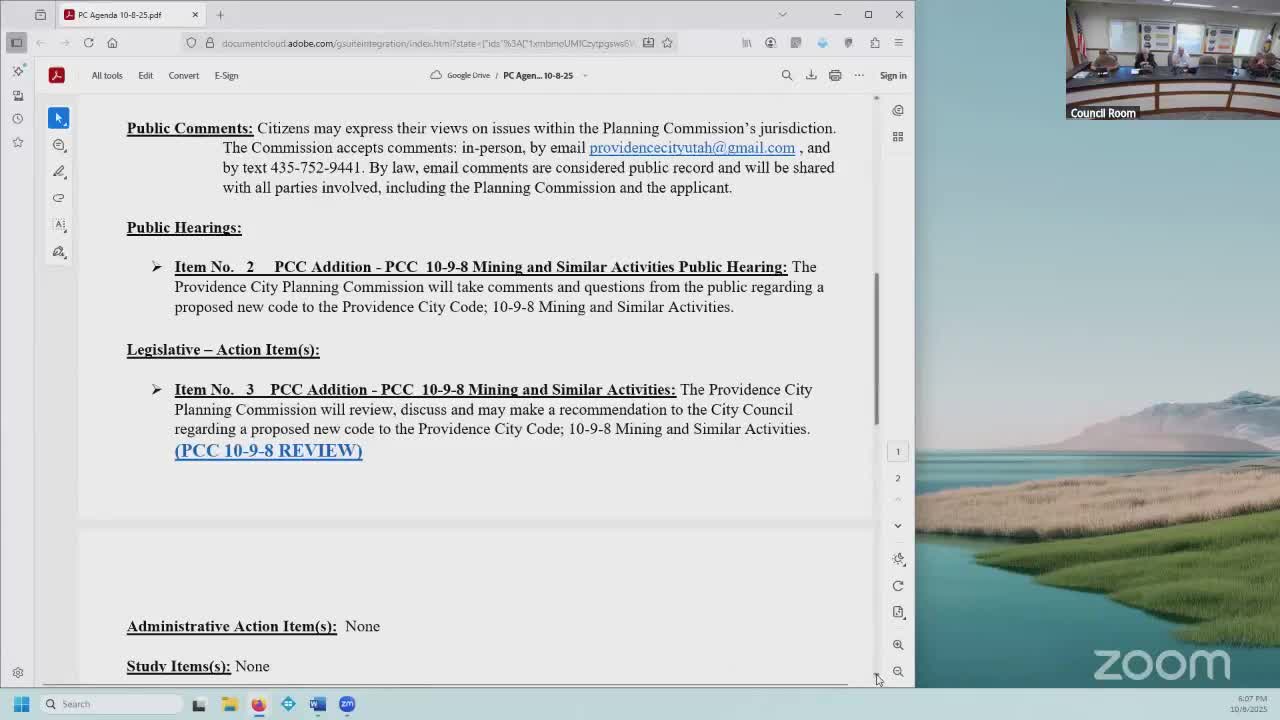Providence planning commission hears residents’ complaints about nearby gravel operations, tables ordinance for attorney review
Get AI-powered insights, summaries, and transcripts
Subscribe
Summary
Residents pressed the Providence City Planning Commission on a temporary gravel‑pit operation near Grandview Drive and asked the commission to prohibit new mining in residential areas. Staff will work with the city attorney and return draft ordinance options to the commission.
Providence City Planning Commission members on Oct. 7 heard more than an hour of public comment and directed staff to consult the city attorney before returning two possible ordinance options: a prohibition on new mining in city limits or a more restrictive conditional‑use regime that would allow limited, regulated extraction.
The hearing drew homeowners from the Grandview Drive area who described weeks of crushing, stockpiles and heavy truck traffic near existing houses and asked the commission either to ban new gravel pits in residential areas or to tighten safety, traffic and air‑quality controls.
The commission convened the public hearing on a proposed Providence City code addition titled “1098 — mining and similar activities.” Scarlett (city planning staff) told the commission the draft restates an older local mining provision and updates it to reflect recently changed state rules, and that the update would require operators to submit traffic plans and an air‑quality plan approved by the Division of Air Quality.
Residents said the current operation has created safety and nuisance problems. Paul Holden, a Grandview Drive resident, said, “none of us up there were notified that was going on.” Matt Barrett, speaking for a group of neighbors, asked, “How did this developer get away with violating ordinances common across the state for this many weeks?” Brent Krones, president of the Providence Highland Community Association, urged the commission to withhold approval of preliminary or final plats until environmental and infrastructure studies are available, saying the development could affect wildlife corridors and stormwater drainage.
Speakers detailed measures they want added to any ordinance. Elizabeth Call said she and others would “vote to not allow a gravel pit at all” in residential areas. Several parents described dust and safety hazards: Sandy Barrett said, “We haven't had air quality for 2 months. None of us can open our windows.” Other comments requested strict limits on truck hours, clearer signage and regular on‑site inspections.
Staff summarized the regulatory context: state mining rules were relaxed earlier in the year, which prompted Providence staff to reinsert a local mining section into the city code to preserve local conditions and require specific mitigation—traffic plans, Division of Air Quality approvals and stormwater controls—at the conditional‑use stage. Scarlett said the city can add on‑site inspection, truck‑hour restrictions, fencing and signage to a future draft.
Commissioners emphasized limits of their authority. Chairman Bob Henke said the planning commission can make a recommendation but the city council has final authority. Commissioners and staff also noted that state regulators (for example, the Division of Air Quality and mining inspectors) enforce certain standards at the state level and that neighbors may report suspected state violations directly to those agencies.
After public comment and staff remarks, the commission voted to table the matter and asked staff to: consult with the city attorney about whether a citywide ban on new mining is legally available, draft a “no mining” ordinance option and a stricter conditional‑use option that incorporates tonight’s safety and traffic recommendations, and return both drafts to the commission for review at the next meeting. The motion to table passed unanimously.
The commission did not take enforcement action against the operation raised by speakers at the hearing. Commissioners and staff repeatedly said existing phases of the subdivision that have finished administrative review cannot be retroactively changed by the planning commission; any regulatory change is more likely to affect future phases or new applications.
